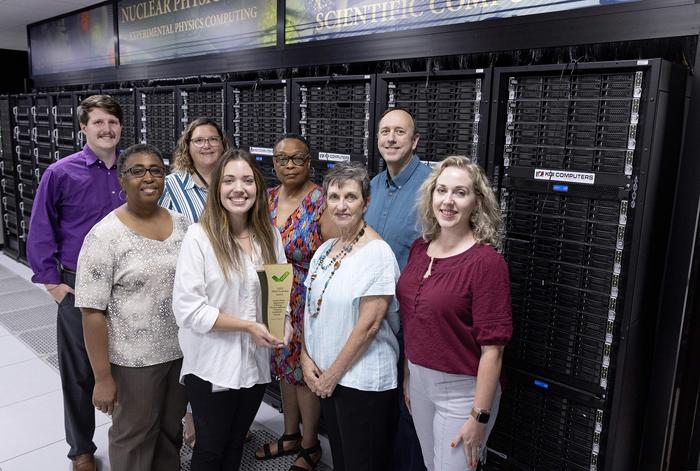NEWPORT NEWS, VA – Staff and scientific users at the U.S. Department of Energy’s Thomas Jefferson National Accelerator Facility need all kinds of electronics to do their jobs, including computers, smartphones, printers and more. But instead of buying just any laptop off the shelf, the lab takes care to buy devices that meet sustainability standards when possible.

Credit: Jefferson Lab Photo/Aileen Devlin
NEWPORT NEWS, VA – Staff and scientific users at the U.S. Department of Energy’s Thomas Jefferson National Accelerator Facility need all kinds of electronics to do their jobs, including computers, smartphones, printers and more. But instead of buying just any laptop off the shelf, the lab takes care to buy devices that meet sustainability standards when possible.
During a virtual ceremony on July 27, the Global Electronics Council presented Jefferson Lab with a 2023 EPEAT Purchaser Award for buying sustainable electronics in fiscal year 2022.
These devices meet Electronic Product Environmental Assessment Tool standards, also known as EPEAT. The devices that meet these standards are more energy efficient, less toxic, longer lasting and easier to recycle than typical electronics.
Although EPEAT devices are more environmentally friendly, they sometimes come with higher price tags up front.
“By purchasing EPEAT devices, we’re signifying we will take that extra step to be sustainable,” said Aubrie Davie, energy and sustainability specialist at Jefferson Lab. “We show it’s not just the price tag that we care about, but making sure that these products we’re bringing onto our campus are also environmentally friendly.”
However, these products often offer the best overall value, because they are more efficient and can help save money in the long run. The lab saved $15,532 in 2022 by using electronics that meet EPEAT criteria. The 645 purchased EPEAT devices also reduced the lab’s greenhouse gas emissions by an amount equal to removing 18 average U.S. passenger cars from the road for one year, and they conserved energy equivalent to the yearly electricity consumption of 31 average U.S. households.
“That’s a huge part of why we do this,” Davie said.
She also hopes the award will signal to the Newport News community that the lab is serious about sustainability.
“I think it’s important for us to show the community that we care about our impact in this area and that we’re not just going to purchase devices that are going to end up in our local landfills or things like that,” she said.
A dedication to being green
This commitment to the environment is nothing new. Jefferson Lab has earned an EPEAT award every year since 2016.
“We are honored to be a 2023 EPEAT Purchase Award winner,” said Barbara Rice, procurement officer at Jefferson Lab. “This is the seventh time the Global Electronics Council has recognized our procurement intention to purchase more energy efficient, longer lasting, and easier-to-recycle equipment that empowers our employees to better serve customers.”
Rice has been the one making sure the lab gets recognition for these accomplishments from the start.
“Barbara has been a huge champion of making sure we apply for these awards and reporting that we have purchased sustainably throughout the year,” Davie said.
Since Jefferson Lab received its first EPEAT Award, it has increased the number of EPEAT electronics it buys from different categories. Determining which EPEAT devices to procure has become a streamlined process for the Computational Science & Technology Division.
“The amount of extra time that it takes to select and purchase EPEAT devices is minimal,” said Davis Wright, a Jefferson Lab computer user support technician.
Wright helps check equipment for EPEAT compliance before purchase, and he maintains a stock of EPEAT devices available for staff and scientific users.
“The award shows us that our system is working. It’s a great feeling to work for an organization that takes pride in sustainability and incorporates it in all facets,” Wright said. “By receiving this award, Jefferson Lab sets an example for other organizations and industries, showcasing that sustainability is not just a buzzword but a tangible goal.”
In the meantime, Jefferson Lab continues to push its sustainability goals further, which will aid in the DOE’s goal of net zero emissions. For instance, fiscal year 2022 DOE sustainability goals include steps toward the transition to a zero-emission vehicle fleet and development of a strategy toward net-zero emissions for buildings, campuses and installations. The plan also includes sustainable procurement.
“It’s great to be acknowledged, but I think it’s important to shoot higher,” Davie said. “We can continue to expand the categories we purchase in and find new ways to be sustainable and achieve emissions and energy-reduction goals. Net zero is a big task for such a large facility. I think building on successful programs like this will help us get there.”
By Chris Patrick
-end-
Jefferson Science Associates, LLC, manages and operates the Thomas Jefferson National Accelerator Facility, or Jefferson Lab, for the U.S. Department of Energy’s Office of Science. JSA is a wholly owned subsidiary of the Southeastern Universities Research Association, Inc. (SURA).
DOE’s Office of Science is the single largest supporter of basic research in the physical sciences in the United States and is working to address some of the most pressing challenges of our time. For more information, visit https://energy.gov/science.



